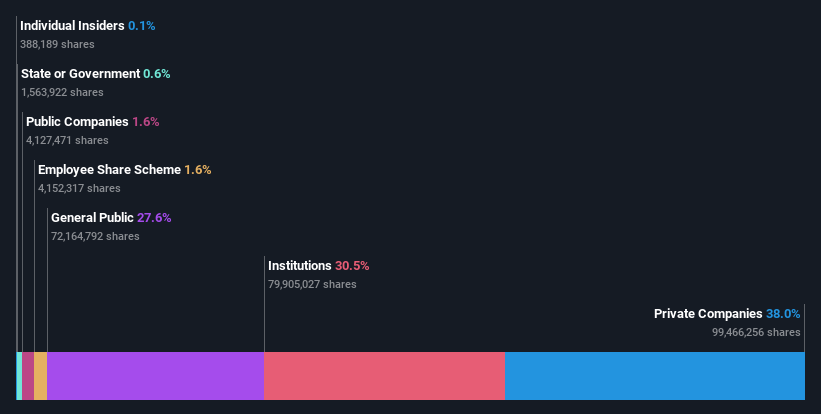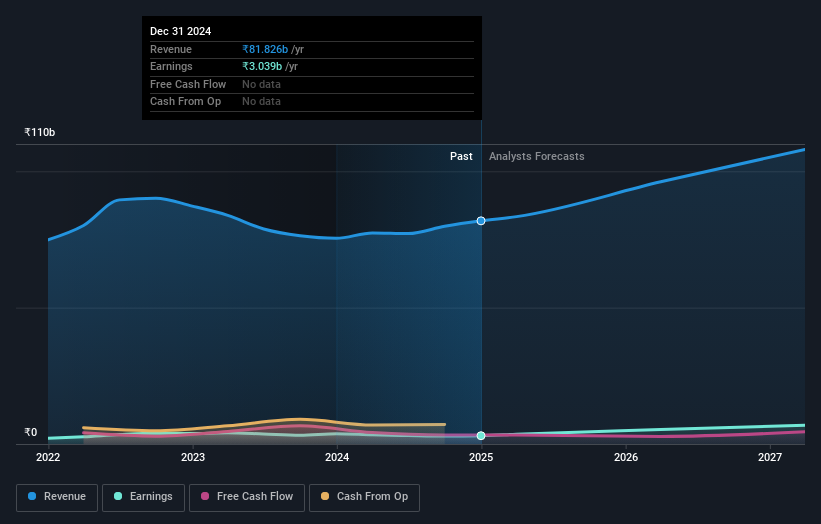Both private companies who control a good portion of Arvind Limited (NSE:ARVIND) along with institutions must be dismayed after last week's 7.8% decrease

Key Insights
- Significant control over Arvind by private companies implies that the general public has more power to influence management and governance-related decisions
- The top 7 shareholders own 52% of the company
- Institutions own 31% of Arvind
A look at the shareholders of Arvind Limited (NSE:ARVIND) can tell us which group is most powerful. We can see that private companies own the lion's share in the company with 38% ownership. Put another way, the group faces the maximum upside potential (or downside risk).
While institutions, who own 31% shares weren’t spared from last week’s ₹7.3b market cap drop, private companies as a group suffered the maximum losses
Let's delve deeper into each type of owner of Arvind, beginning with the chart below.
See our latest analysis for Arvind

What Does The Institutional Ownership Tell Us About Arvind?
Institutions typically measure themselves against a benchmark when reporting to their own investors, so they often become more enthusiastic about a stock once it's included in a major index. We would expect most companies to have some institutions on the register, especially if they are growing.
Arvind already has institutions on the share registry. Indeed, they own a respectable stake in the company. This suggests some credibility amongst professional investors. But we can't rely on that fact alone since institutions make bad investments sometimes, just like everyone does. When multiple institutions own a stock, there's always a risk that they are in a 'crowded trade'. When such a trade goes wrong, multiple parties may compete to sell stock fast. This risk is higher in a company without a history of growth. You can see Arvind's historic earnings and revenue below, but keep in mind there's always more to the story.

Hedge funds don't have many shares in Arvind. Mayur Prakash Trading and Commercial Private Limited is currently the largest shareholder, with 34% of shares outstanding. With 5.7% and 3.2% of the shares outstanding respectively, quant Money Managers Ltd. and HDFC Asset Management Company Limited are the second and third largest shareholders.
We did some more digging and found that 7 of the top shareholders account for roughly 52% of the register, implying that along with larger shareholders, there are a few smaller shareholders, thereby balancing out each others interests somewhat.
While studying institutional ownership for a company can add value to your research, it is also a good practice to research analyst recommendations to get a deeper understand of a stock's expected performance. Quite a few analysts cover the stock, so you could look into forecast growth quite easily.
Insider Ownership Of Arvind
The definition of an insider can differ slightly between different countries, but members of the board of directors always count. The company management answer to the board and the latter should represent the interests of shareholders. Notably, sometimes top-level managers are on the board themselves.
I generally consider insider ownership to be a good thing. However, on some occasions it makes it more difficult for other shareholders to hold the board accountable for decisions.
Our most recent data indicates that insiders own less than 1% of Arvind Limited. But they may have an indirect interest through a corporate structure that we haven't picked up on. It appears that the board holds about ₹129m worth of stock. This compares to a market capitalization of ₹87b. We generally like to see a board more invested. However it might be worth checking if those insiders have been buying.
General Public Ownership
The general public, who are usually individual investors, hold a 28% stake in Arvind. While this size of ownership may not be enough to sway a policy decision in their favour, they can still make a collective impact on company policies.
Private Company Ownership
We can see that Private Companies own 38%, of the shares on issue. It might be worth looking deeper into this. If related parties, such as insiders, have an interest in one of these private companies, that should be disclosed in the annual report. Private companies may also have a strategic interest in the company.
Next Steps:
It's always worth thinking about the different groups who own shares in a company. But to understand Arvind better, we need to consider many other factors. Consider for instance, the ever-present spectre of investment risk. We've identified 2 warning signs with Arvind , and understanding them should be part of your investment process.
But ultimately it is the future, not the past, that will determine how well the owners of this business will do. Therefore we think it advisable to take a look at this free report showing whether analysts are predicting a brighter future.
NB: Figures in this article are calculated using data from the last twelve months, which refer to the 12-month period ending on the last date of the month the financial statement is dated. This may not be consistent with full year annual report figures.
New: Manage All Your Stock Portfolios in One Place
We've created the ultimate portfolio companion for stock investors, and it's free.
• Connect an unlimited number of Portfolios and see your total in one currency
• Be alerted to new Warning Signs or Risks via email or mobile
• Track the Fair Value of your stocks
Have feedback on this article? Concerned about the content? Get in touch with us directly. Alternatively, email editorial-team (at) simplywallst.com.
This article by Simply Wall St is general in nature. We provide commentary based on historical data and analyst forecasts only using an unbiased methodology and our articles are not intended to be financial advice. It does not constitute a recommendation to buy or sell any stock, and does not take account of your objectives, or your financial situation. We aim to bring you long-term focused analysis driven by fundamental data. Note that our analysis may not factor in the latest price-sensitive company announcements or qualitative material. Simply Wall St has no position in any stocks mentioned.
About NSEI:ARVIND
Arvind
Manufactures, markets, retails, supplies, and exports textiles in India and internationally.
Excellent balance sheet with reasonable growth potential and pays a dividend.
Similar Companies
Market Insights
Community Narratives




